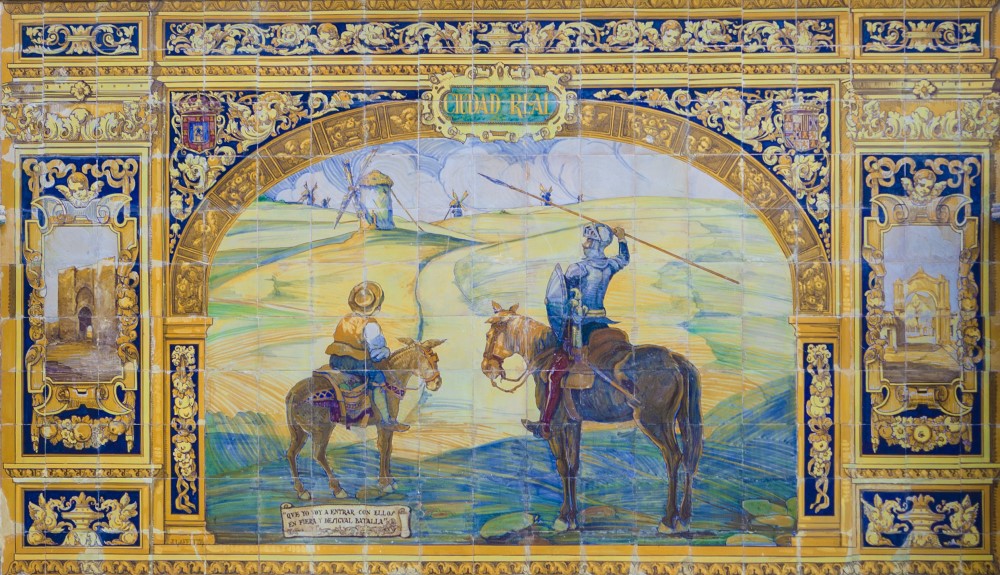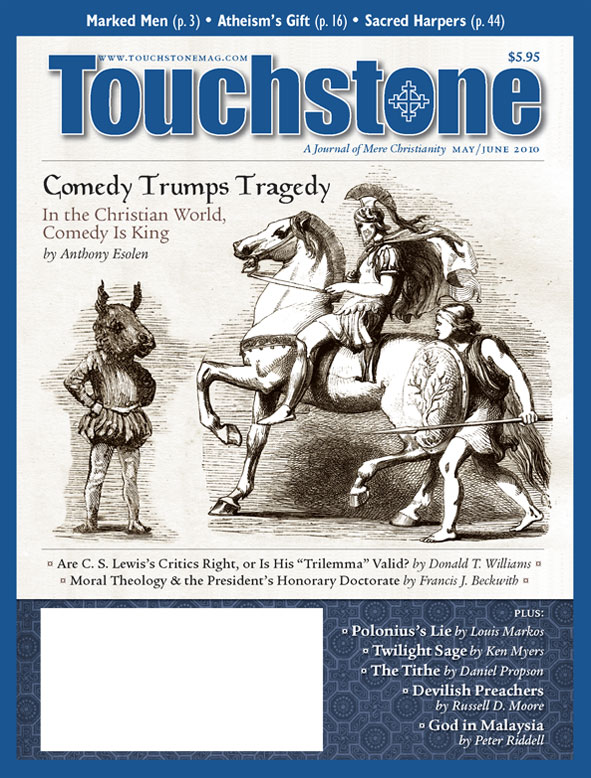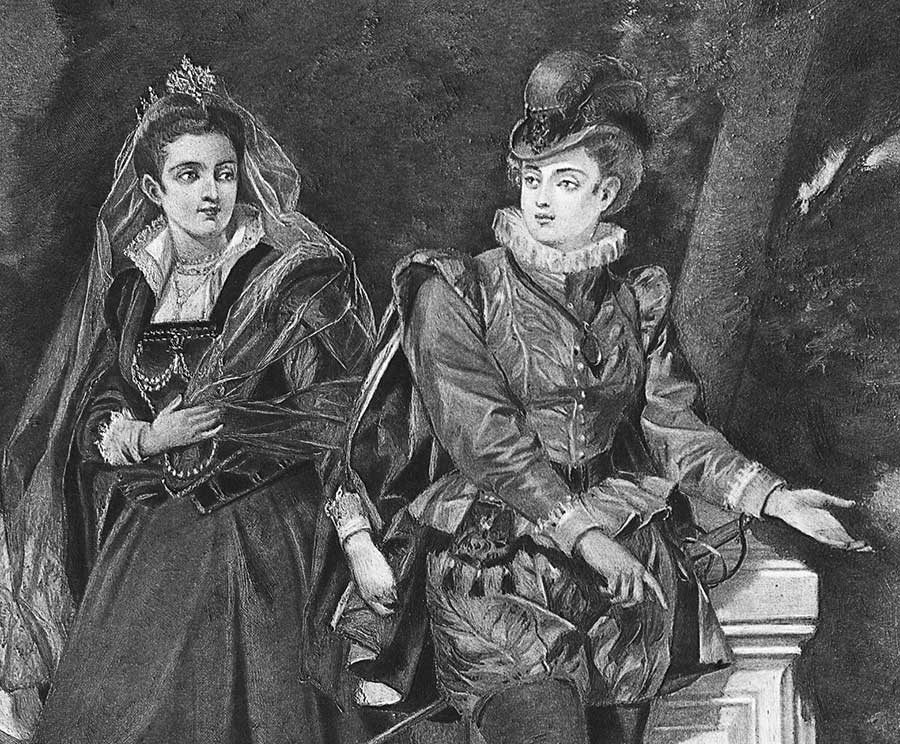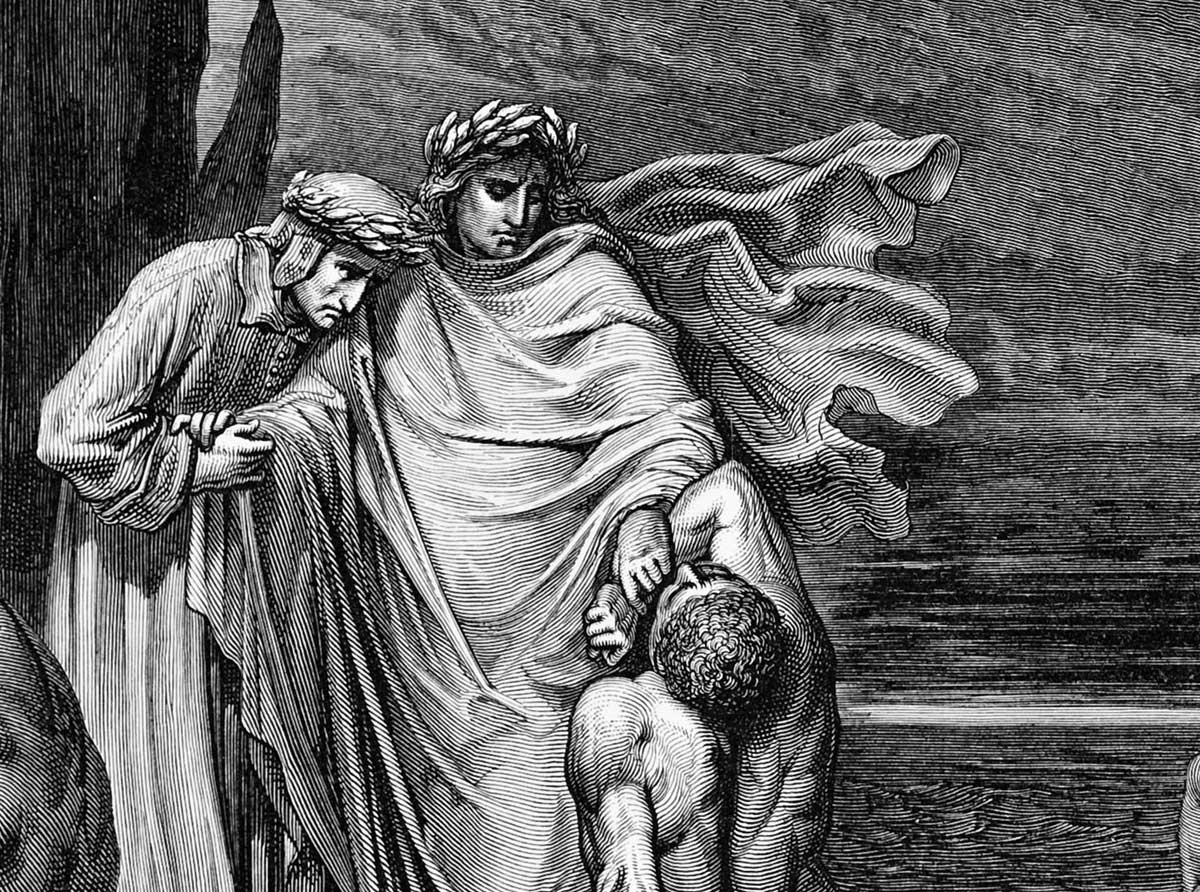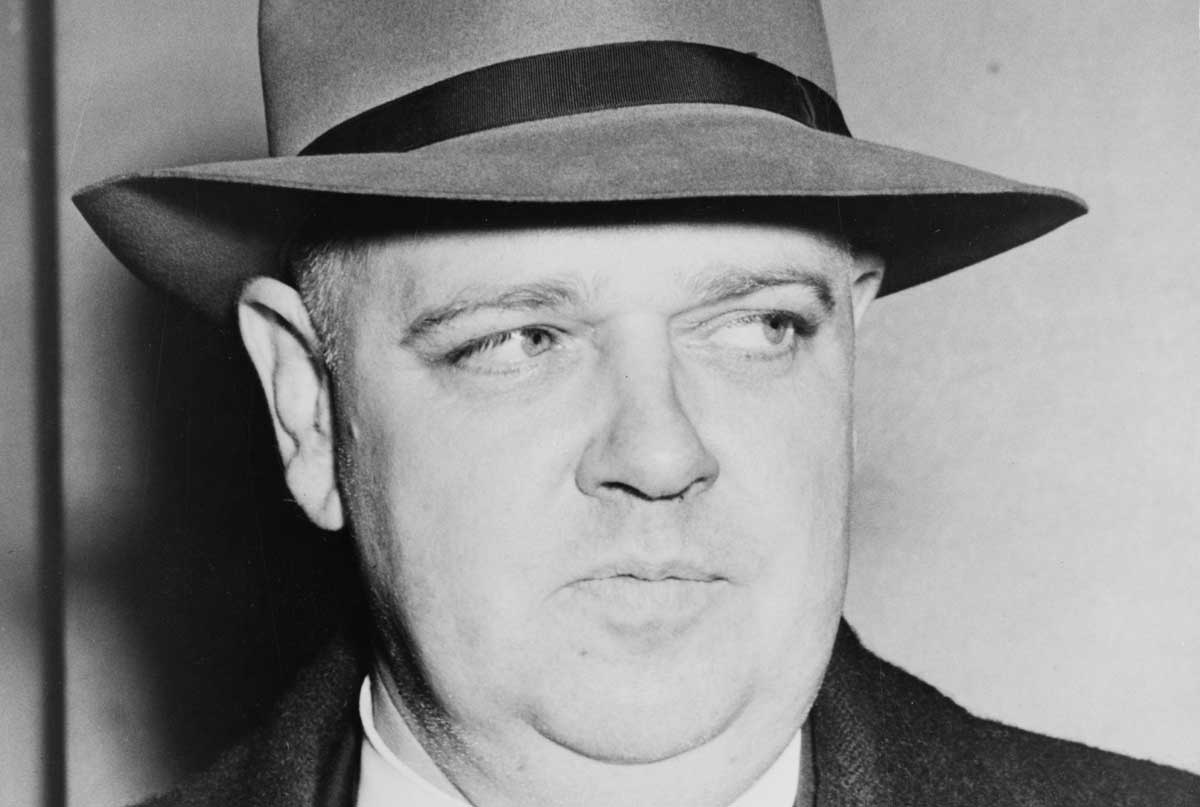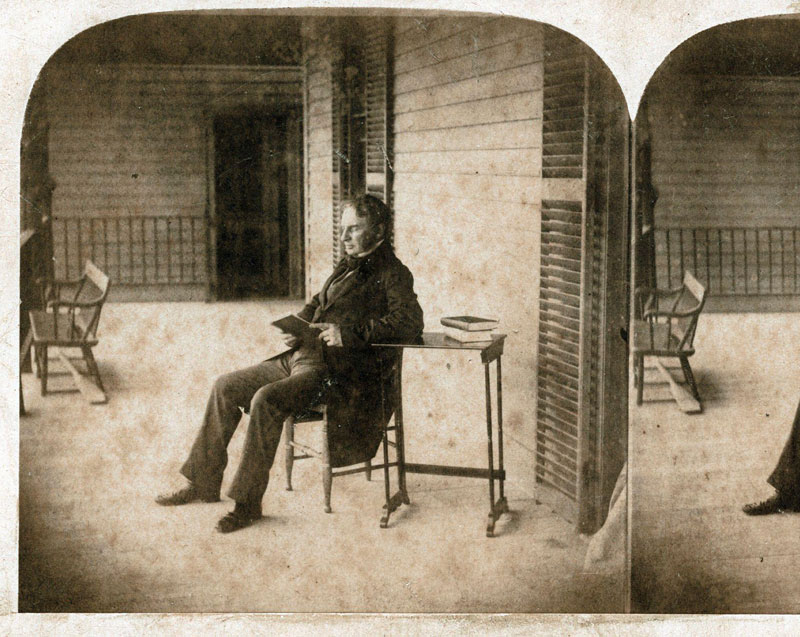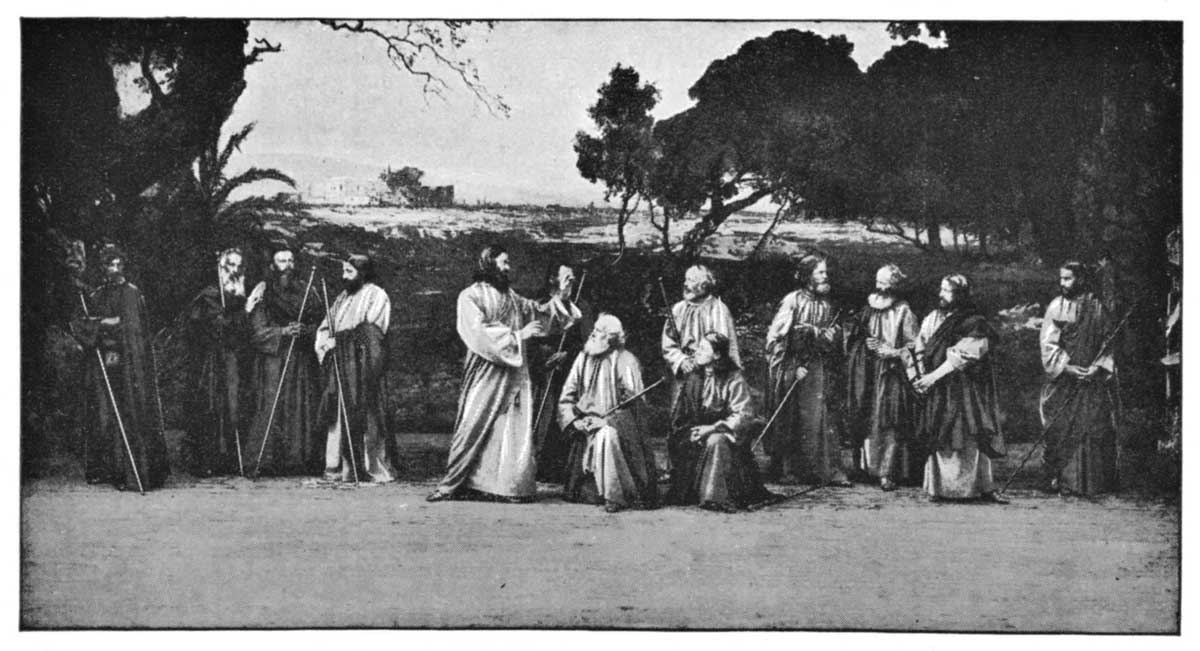Feature
Humor on
the Move
In the Christian World, Comedy Is King
Aristotle remarked that in comedy we laugh at the vices of those beneath us, in rank, intelligence, or dignity. So politicians have always been the butts of laughter, along with misers, misanthropes, intellectuals, swaggering soldiers afraid of their shadows, shifty butlers, woodenheaded masters, jealous husbands, women on the make, and young lads in love with them. They are all types, easy to take to the woodshed: people reduced to a single salient and ridiculous feature.
For example, in The Acharnians, Aristophanes turns the war-leader Lammachus into a blustering fool, moaning from a sprained ankle. Or think of mad Mr. Dick in David Copperfield. He’s a man with two absorbing interests: writing his memoirs, and flying kites. But in his writing he always stumbles at the beheading of Charles I, and in the end he takes up his scribbled sheets and makes a kite out of them.
Yet as we move from the classical to the Christian world, we note a difference. Dickens could have conceived of the phony patriot Lammachus—and did, in Mr. Podsnap ( Our Mutual Friend), who dismisses any new idea with a wave of his arm and the verdict, “Not English!” But Aristophanes could not have conceived of Mr. Dick. When young David Copperfield, having run away from the bottling factory, shows up ragged and starved at the house of his aunt, Betsey Trotwood, that kindly battleaxe turns to Mr. Dick for advice. What should they do with him? He, flabbergasted, stammers out, “I should give him a bath!”
“No one knows that man’s mind as I do,” says Betsey Trotwood.
The Pagan Universe
What has changed? Can Aristotle’s dictum account for the mystery of the good Mr. Dick—or, say, of Ralph Kramden, Bottom the Weaver, and St. Francis of Assisi?
The answer may be suggested by the pagan universe, or rather, by the lid that clamps it shut. Aristotle posited that the universe of things in motion could not exist without a Prime Mover; yet the Prime Mover could not exist without a universe to move. They are coeternal. They have been moving forever, but they’re not going anywhere. No surprise. Greek myths explain how we arrived where we are now, but say nothing about where we’re headed.
The gods punished man by marrying Epimetheus, an archetypal weakling, with Pandora, headstrong and meddlesome. Do we not know such? Pandora had to open that box the cunning gods warned Epimetheus to keep shut, and out flew all the troubles that would plague the world: disease, war, strife, avarice, folly, decay, and death. By the time she and her silly husband shut that box again, only Hope remained. Such is our unalterable state.
Nor should we confuse that hope with the Christian virtue. Your best hope, the pagan wise men tell us, is to win a good name among your countrymen, live in modest comfort, raise admirable children, and die before it goes to smash.
An (Almost) Happy Man
“Count no man happy until he dies,” said Solon. He took that tragic wisdom with him after he wrote a constitution for Athens, left it to the politicians to wreck, and went traveling to see the human tragedy elsewhere. He came to Lydia and its emperor, Croesus, who was, without exaggeration, as rich as Croesus, and not shy about it. “Look at all I enjoy!” he cried to Solon, unwittingly reducing himself to a caricature. “Have you ever met a man happier than I am?”
“I have,” said Solon, and named a certain Greek who led the modest life I have described. “Count no man happy until he dies.”
Croesus smiled with that superior knowledge which is the mark of folly. Soon after, not satisfied with his native land, he hankered after Persia, too. So he sent gifts to the oracle at Delphi (somehow, even in a universe ruled by fate, it helps to bribe the prophets) to ask what he should do. “If Croesus attacks Persia,” said the oracle, “a great empire will be destroyed.” So Croesus attacked Persia, and a great empire was destroyed: his own.
Seized by the Persians and set upon a pyre, Croesus cried, “Solon, you were right!” The Persian emperor, Cyrus—that same humane ruler who subdued Babylon and sent Nehemiah and the Jews back to Jerusalem from captivity—heard the noise, asked Croesus to explain, and ordered the emperor set free. A happy ending for Croesus, almost. Eventually he died a violent death anyway.
Order, but No Redemption
Aristophanic comedy, I’ll concede, did stress a return to stable social order, but at the cost of reducing villain and hero to one powerful motive, made evident on stage with cruel physicality. Take Lysistrata, for example. It is written at a bad time for Athens, during the great Peloponnesian War. Aristophanes detests the democratic war policy. He believes it is unnatural for Greek to be fighting Greek, particularly when the common enemy Persia grins in the audience, waiting the chance to strike. So he illustrates this violation of order by a neat trick. He will have another part of the Athenian body politic come to its senses before the brain does.
The setup is brilliant. Only women and old men are left in Athens; all the young men are out fighting. Now there’s only one thing a Greek woman wants, and that’s pleasure: to go shopping, to drink, and to perform the rites of Aphrodite, as they put it in a refined age, or to have sex, as we put it in ours.
But the women are frustrated. War has cut off more than trade. The shops are bare, and their husbands absent. So, organized by Lysistrata, and joined by the women of Sparta and Thebes, they seize the Acropolis and go on a sex strike. When we see the men after an interminable abstinence (five days), they are not walking comfortably. Wise Athenians, self-controlled Spartans, lusting for glory, reduced to an absurd stage prop! “What’s that you’ve got under your cloak?” asks the Athenian magistrate to a limping delegate from Sparta. “A Spartan message staff,” replies the delegate. “Really?” says the magistrate, uncovering it. “I’ve got one just like it!”
In this fantasy, the Athenians and Spartans sign a treaty and have a feast, and the last words of the play are sung by the enemy Spartans. Order returns. The men and women are reconciled, and there are a couple of moments that almost open the comedy into a world of mysterious depths—as when one of the old lady allies of Lysistrata digs a fly out of the eye of her doddering husband. But no one has asked forgiveness. There is no redemption for the dead, nor even hope for the future. The best hope is for a return to the days before the war. A lid seals this world.
Out of the Mouths of Babes
And seals man, too. Not that the Greeks sat on their hands and undertook no quests of the intellect or spirit. But even they suspect that one’s character is fixed. As the world is not going anywhere, neither is Cleon the bricklayer nor Melanippe the housemaid. If a man is a fool, that’s that.
Take the notorious Cyclops, Polyphemus . He and the other single-eyed oafs live what the Greeks considered an idiotic life. They are alienated from one another. They till no fields, gather for no assemblies, make no common use of reason. As in America, every family ignores its neighbors. So it is deliciously absurd when Polyphemus tries to outsmart Odysseus. “What is your name, stranger?” he asks. “You tell me your name, and I will grant you a favor.” That is, in return for a skin of wine Odysseus has given him, the Cyclops will eat Odysseus’s comrades first and save him for last. “I am No-Man,” says Odysseus.
The joke is that the Cyclops better deserves that name, as do the foolish suitors who are devouring Odysseus’s estate, and the sluttish housemaids who have betrayed their mistress Penelope. They are all No-Men, because their self-absorption and uncontrolled appetites sever them from past and future, and from any community in the present.
Now and then, Homer hints that there may be something like the depth of human personality, of longing and memory and love, beneath a few of these fools. Even the Cyclops, groping about the sheep after Odysseus and his men have put out his eye, addresses the ram of the flock with real affection and regret. But we expect no wisdom from Polyphemus. Nor from the suitors. The noblest of them, Amphinomus, when Odysseus appeals to him in the guise of a beggar, can only look down, knowing that he and his fellows are doing wrong. But he says nothing. He cannot repent. He, too, shall die.
In that classical world, there is hardly a chance that the fool will speak wisdom. “Greeks seek wisdom, and the Jews seek signs,” says Paul with rare defiance, “but I preach Christ crucified, a stumbling stone to the Jews and folly to the Greeks!” But the folly of God is wiser than men. Wiser even than Greeks. It slaps the staid old classical world silly. There, a man who loses his reputation loses everything. But Christ made himself of no repute, and took the form of a slave, obedient unto death; and he made all things new.
Behold, then, what a cavalcade of Christian fools storms the world! Don Quixote, Bottom the Weaver, Parson Adams, Cordelia, Mr. Dick, Joe Gargery, Sebastian Flyte, Miss Watson’s Jim, Samwise, the courtly mouse Reepicheep. No mere literary tradition, that, but a reflection of how things really are. Says Jesus, “I praise thee, Father in heaven, and give thee glory, that thou hast hidden these things from the wise of this age, and revealed them unto babes.” For just as only someone who knows he is a wretch begs for grace, so only someone who knows he is a fool is ready to see.
Laughing for Love
We find this merry folly, wedded to a profound humanity and an ardent longing for God, in that most amiable of fools, St. Francis. One day Satan appeared to a friar as the crucified Christ, to harass him into despair. “Oh, Brother Rufino, why do you afflict yourself with prayers and penances, since you are not among those who are predestined to eternal life?” You’re damned, he says, and so is Francis, and so are all those who follow him.
Rufino grew morose. When the gentle-spoken Francis heard about it, he did not give him a theology lesson. Francis was no theologian. He gave him some earthy wisdom instead, saying, “When the devil says to you again, ‘You are damned,’ you answer him confidently, ‘Open your mouth—and I will empty my bowels into it.’” Actually, Francis used a more direct expression. Then he reminded Rufino that Christ never hardens the heart of the faithful man but softens it, taking away our hearts of stone and giving us hearts of flesh. So Rufino, as if a physician had lanced a hidden infection, wept bitterly for having sinned against faith and went off to pray in the woods.
There the devil appeared to him again, and Rufino replied as Francis had instructed. The devil was, ahem, taken aback. The rockslide, says the author of the account, is still to be seen on the side of Mount Subasio. But Rufino went away consoled, and Christ appeared to him in a dream to tell him that he would never again be sad.
It’s a humorous anecdote, and no doubt the commoners of Umbria delighted in it. But glinting beneath it is a profound wisdom, not academic, but human and divine. We can fast and pray ourselves into knots. We can think our way to hell. But one touch of faith, the object of hope, and the font of love, can send the old and serious madness of sin and despair packing. Call it the unseemly frivolity of God.
Classical decorum? By its standards, Francis is inconceivable. His Greek counterpart is not the urbane and witty Socrates. It is a self-styled philosopher who dressed in rags, never washed, emptied his bowels wherever he pleased, and said he had spent all his life searching for an honest man. His name was Diogenes, and the people spurned him as a stray dog: Diogenes the Cynic. The classical world is that place wherein Francis is Diogenes, and his humor, laced with pride, treats the world with contempt. Francis once traveled to convert the Sultan, who so admired the man’s simple faith that he gave him safe conduct home. Diogenes? Philip of Macedon once stood above the philosopher and asked whether he could do anything for him. “Yes,” said Diogenes. “You can get out of my light.”
Francis—like every deeply Christian fool, deeply Christian and deeply foolish—found that wisdom because he had drawn near to Christ. He could preach to the birds, and wag his finger at Brother Wolf and tell him to leave the people of Gubbio in peace, and wash and heal the angry blaspheming leper, because long before he received the marks of Christ on his body, he had known the joy of suffering for his Savior’s sake. “Brother Leo,” he says, “even if a Friar Minor gives sight to the blind, heals the paralyzed, drives out devils . . . and what is still more, brings back to life a man who has been dead four days, write that perfect joy is not in that.” Nor in knowing all languages and all Scripture, nor in prophecy, eloquence, knowledge of herbs and animals and man, not even in converting every infidel to the faith.
Where then does it lie? Francis describes a litany of rebuffs and humiliations, concluding, “If we endure all those evils and insults and blows with joy and patience, reflecting that we must accept and bear the sufferings of the Blessed Christ patiently for love of him, oh, Brother Leo, write: that is perfect joy!” All gifts that confer glory are not ours but God’s, but we can own the Cross, says Francis, quoting the Apostle: “I will not glory save in the Cross of Our Lord Jesus Christ!”
One hour of that little man’s life was richer than twenty years of ours. The faith has not made us all like him. But it has made us glance now and then at the clown, the beggar, the child, the madman, the saint. If we laugh at Francis, we laugh for love.
The Dream That Hath No Bottom
C. S. Lewis wrote in The Weight of Glory that no one has ever met an “ordinary” man: Every man is on a journey to one of two extraordinary destinies. The classical world knows nothing of this. In classical tragedy, we meet the gods and heroes of myth, their stories retold to comment upon the human condition and upon the great political issues of the day. In the hands of Aeschylus, Sophocles, and Euripides, they will reveal vertiginous depths of personality: Clytemnestra is a woman capable of passionate love and loyalty, and of implacable hatred and vengeance. But their connection with the fellow who repairs the mortar for the theater is distant and abstract. Man is a riddle, and Cleon the mason is a man. But a Cleon cannot serve as a tragic exemplar of mankind. His problems are not interesting. To laugh at him would be gratuitously cruel. He is beneath both tragedy and comedy.
The Christian vision changes that. We can see that change in Shakespeare’s A Midsummer Night’s Dream. The two young couples with the crisscrossed affections, and the old father who favors one suitor over another, are stock motifs from classical comedies of errors. It’s a stroke of genius for Shakespeare to turn the woods outside Athens into an English forest, peopled with the sprites of folktales, and to have the King and Queen of the Fairies be embroiled in a romantic comedy of their own. But nothing could prepare a classical audience for Bottom the Weaver and his bumpkin friends, going into the woods to practice a play—a classical tragedy!—for the nuptials of Duke Theseus and Queen Hippolyta.
Bottom is a profoundly silly man. But by comparison, the noble, “classical” characters appear pale. Lysander and Demetrius fight for whichever girl they’re madly in love with at the moment, but Bottom really is brave, in his blustery way. He’s happy to learn that he’s going to play Pyramus, “a lover that kills himself, most gallant, for love.” But his “chief humor,” he says, “is for a tyrant. I could play Ercles rarely, or a part to tear a cat in, to make all split”—and he gives us a bombastic example. “This was lofty!” he exclaims. “This is Ercles’ vein, a tyrant’s vein. A lover,” he explains for his less experienced fellows, “is more condoling.”
Demetrius and Lysander spend half the night playing the courtly lover, and the rest of it playing the cad. Demetrius once sued for Helen’s hand, and now is not ashamed to spurn her as a spaniel:
Tempt not too much the hatred of my spirit,
For I am sick when I do look on thee.
Then we have the more pleasant Lysander, addled by Puck’s love potion, spurning his beloved Hermia:
Hang off, thou cat, thou burr! Vile thing,
let loose,
Or I will shake thee from me like a serpent!
At that moment, we smile to remember, the “translated” Bottom with an ass’s head on his shoulders has gone off with the Queen of the Fairies, another victim of midsummer magic. Titania says she fell for Bottom’s beauty at first sight, to which Bottom replies with surprising self-awareness and gallantry: “Methinks, mistress, you should have little reason for that. And yet, to say the truth, reason and love keep little company together nowadays; the more the pity, that some honest neighbors will not make them friends.” It’s said with a smile at our folly, yet that is about the wisest speech in the play.
Bottom has a big imagination—maybe a bottomless imagination. He can’t actually perform any of the roles he wants to play, but he does want to play them, and he wants to please. He’ll play such a lion as won’t frighten the ladies: “I will roar you as gently as any sucking dove.” His excitement and generosity are infectious. “Where are these lads?” he cries, back in his true shape. “Where are these hearts?” And Peter Quince the director bursts out, rejoicing for a friendship restored, “Bottom! O most courageous day! O most happy hour!”
What has happened to Bottom in the meantime? He can hardly tell. He’s awakened from fairyland, scratching his ears. “I have had a most rare vision,” he says.
I have had a dream, past the wit of man to say what dream it was. Man is but an ass, if he go about to expound this dream. Methought I was—and methought I had—but man is but a patched fool if he will offer to say what methought I had. The eye of man hath not heard, the ear of man hath not seen, man’s hand is not able to taste, his tongue to conceive, nor his heart to report, what my dream was. I will get Peter Quince to write a ballet to this dream. It will be called “Bottom’s Dream,” because it hath no bottom.
Bottom, quoting—or mangling—St. Paul! Only Shakespeare could find the high humor of it. We watch as Bottom and his rude mechanical friends put on the “tedious brief scene of young Pyramus and his love Thisbe; very tragical mirth.” The nobles watch too, commenting wryly on the ineptitude, but they do not know that we watch them in turn and see the play as an ironic portrayal of their own folly. Beyond the walls of Theseus’s palace lie the woods and the fairies, an unsuspected world of wonder. But beyond that world lies another, the great and true world that includes and redeems all worlds. In that world, we find the glory that eye has not seen, nor ear heard, nor the mind of man conceived. And Bottom the Weaver, who for a time wore an ass’s head and was courted by the Fairy Queen—he is the one granted an inkling of its existence.
Very Tragical Mirth
Bottom lives on. I’m thinking of a bus driver who lives with his wife in a two-room flat in Brooklyn. His life is bounded by the narrowest of walls. All we ever see of that flat are two doors, the fire escape, the stove, the sink, one table, and one chest of drawers. There is nothing else. The rest of the bus driver’s life is parceled out at the depot, the pool hall, the bowling alley, and the Raccoon Lodge.
Ralph Kramden is a stock comic figure, or several rolled into one. He is always overmastered by one weakness or another. He has a snide mother-in-law whom he hates. We watch with mounting glee as he tries to endure a visit from her. She carps about the poor flat, about the boys her daughter Alice could have married, about Ralph’s weight, and so forth. Ralph is steaming. Alice defends him a little by telling her mother that he has just gotten tickets for the new Broadway murder mystery. “Oh, that old thing,” says mother, and reveals the end of the plot. Ralph explodes. “You,” he shouts, pointing at her and getting in her face, “are a blabber-mouth!” He throws her out of the apartment, and Alice, the frustrated and difficult wife, leaves in a cold rage.
Yet here in this most shopworn of comic reductions we are surprised by the mystery of a suffering human soul. The mother-in-law has reason to be dissatisfied with Ralph, and he knows it. But she takes pleasure in hurting him. Alice’s loyalties are divided, but at the critical moment she does what she so often does in The Honeymooners: She disappoints her foolish husband and sides against him. Of the three, we are most interested in Ralph, though we can hardly find a good thing to say about him. We enjoy watching him suffer—there is cruelty in The Honeymooners—but we suffer with him, too. It is indeed very tragical mirth.
So with all of Ralph’s humors. They are too big for a classical stage. He is too big for any stage. Beyond that flat lies the strange and confused universe of Ralph’s character and imagination. He is vain, impetuous, ambitious, lazy, boastful, shy, pugnacious, and softhearted, all at once. He wants to be rich, to be the Big Man in Bensonhurst, passing out dollars like candy, and giving Alice fancy presents—even a new kitchen table! So he schemes to get rich quick. He tries to hawk a rickety contraption that looks as if an eggbeater had mated with a pencil sharpener. “The Handy Housewife Helper” it’s called, and he spends his savings to buy crates of them to sell at a dollar apiece, advertising them on television. To save money, he and his pal Norton do the commercial themselves. He blusters along to the moment when they are on the air—and then panics.
“Are you the Chef of the Future?” asks Norton.
“Humna-humna-humna Chef of the Future!”
As when Ralph bought a diner just before the highway was moved, or as when he pretended to be a golf pro to impress his boss, or as when he disrupted the neighborhood by renting a piano to prepare for questions about popular music on a quiz show, or as when he found an unclaimed briefcase full of money and spent it like water before it was revealed to be counterfeit—as when anything and everything that has happened in Ralph’s life, it is a disaster.
Ralph must lose. It is a law of the show. He dreams; and his folly, or fate, or Alice, will crush the dream. Yet he dreams again. It would disappoint us if he were to say, one morning, “I see that I will always be only a bus driver.” That is because he is not only a bus driver. He is one of those ordinary men in a world that has been touched by the Christian folly: the extraordinary man, who longs for a world beyond the walls of his flat, and who is so foolish as to hope that someday he might love Alice as she deserves to be loved, and that she would return that love.
Humor as Big as the World
The pagans believed the world was tragic, and pinned their comedy accordingly. We Christians believe the world is comic, and that allows us to show humor on the move, comedy going somewhere, with many a tragic possibility along the way. It makes no sense to forgive what cannot be otherwise. There is no romance in following the fortunes of a character fixed in place. Fixity is hell, and there is no forgiveness there. But there is something other than fixity in that cramped flat in Bensonhurst.
Return to the time when Ralph threw his mother-in-law out, and Alice left him. Ralph is desperate. Despite their quarreling, Ralph and Alice do love one another, not sentimentally, but determinedly, in and through their childlessness and poverty. So he must get Alice to return.
Here the wise fool Norton comes up with a plan. It’s absurd that anyone should take advice from Norton, the man-child who dons a helmet to watch Video Ranger on television. But this plan seems all right. Ralph will speak into Norton’s recording machine and cut a record telling Alice how sorry he is and how much he loves her. They try it, and Ralph begins meekly enough, but when he remembers his mother-in-law he loses his temper again and shouts, “She’s a blabbermouth!” That record won’t do. They cut a second, sweet and full of apologies. Then Norton promptly picks up the wrong record, puts it in an envelope, and mails it to Alice.
Here the marriage and the show should end, and without the sense that there is a glory which eye has not seen, nor ear heard, it would end. The pagan comedian would never have put Ralph on stage, but had he done so, he would have punished him mercilessly, and perhaps Alice would have run off with one of those rich boys after all. But in The Honeymooners, Ralph and Alice are always reunited with an attempt to suggest, if for a moment, the mysteries of a love that transcends failure and pain. Not that the writers and actors always succeeded, or avoided sentimentality. But they knew what they were about. If they failed, they failed as Ralph failed, at something bigger than themselves.
We can forgive them, knowing how much we have been forgiven. We, too, can make our humor as big as the world. It may not be in the lectionary, and it may be frivolous, and not what you should say in the presence of your Author, but we could do worse in that new heaven and earth than to greet one another with a bear hug and a foolish smile. As Ralph says to Alice, “Baby, you’re the greatest.” •
Anthony Esolen is Distinguished Professor of Humanities at Thales College and the author of over 30 books, including Real Music: A Guide to the Timeless Hymns of the Church (Tan, with a CD), Out of the Ashes: Rebuilding American Culture (Regnery), and The Hundredfold: Songs for the Lord (Ignatius). He has also translated Dante’s Divine Comedy (Random House) and, with his wife Debra, publishes the web magazine Word and Song (anthonyesolen.substack.com). He is a senior editor of Touchstone.
subscription options
Order
Print/Online Subscription

Get six issues (one year) of Touchstone PLUS full online access including pdf downloads for only $39.95. That's only $3.34 per month!
Order
Online Only
Subscription

Get a one-year full-access subscription to the Touchstone online archives for only $19.95. That's only $1.66 per month!
bulk subscriptions
Order Touchstone subscriptions in bulk and save $10 per sub! Each subscription includes 6 issues of Touchstone plus full online access to touchstonemag.com—including archives, videos, and pdf downloads of recent issues for only $29.95 each! Great for churches or study groups.
Transactions will be processed on a secure server.
more on Literature from the online archives
more from the online archives
calling all readers
Please Donate
"There are magazines worth reading but few worth saving . . . Touchstone is just such a magazine."
—Alice von Hildebrand
"Here we do not concede one square millimeter of territory to falsehood, folly, contemporary sentimentality, or fashion. We speak the truth, and let God be our judge. . . . Touchstone is the one committedly Christian conservative journal."
—Anthony Esolen, Touchstone senior editor





